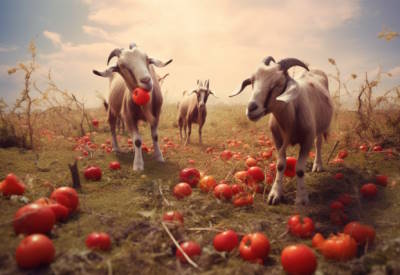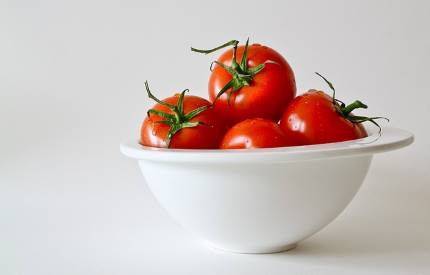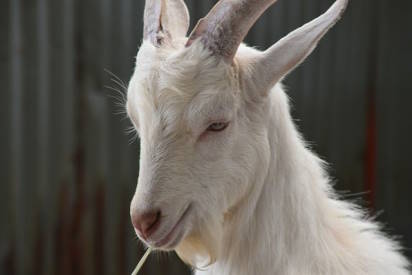As a homesteader and proud owner of happy and healthy goats, one of the most frequent questions other goat enthusiasts ask me is: can goats eat tomatoes? This query might appear simple at first glance, but there are many nuances to consider before offering a plump red fruit to your four-legged companion.
The definitive answer is yes; goats can eat ripe tomatoes. These delightful fruits offer various health benefits to our caprine friends, packed with essential vitamins, minerals, and antioxidants. However, it’s important to be well-informed about the potential hazards associated with feeding tomatoes, specifically the toxic parts of the tomato plant, to prevent harm to your beloved goats.
So, allow me to guide you through the intricacies of this seemingly straightforward question. In the following sections, we’ll delve deeper into the pros and cons of feeding tomatoes to goats, the best practices, and the steps to take if your goats sneak into your tomato patch.
Tomatoes and the Nightshade Family
Tomatoes belong to a family of plants known as Solanaceae, more commonly referred to as the nightshade family. This diverse family includes over 2,000 species, including many we’re familiar with daily: tomatoes, potatoes, eggplants, peppers, and even tobacco. The name “nightshade” might sound ominous, and there’s a reason for this.
Many plants in the nightshade family contain naturally occurring compounds called alkaloids. Alkaloids, specifically solanine, can be toxic when consumed in large quantities or ingested by certain species. In the case of tomatoes, these toxic alkaloids are found predominantly in the green parts of the plant – the leaves, stems, and unripe fruit.
This is why it’s safe for goats to eat ripe tomatoes but not the leaves or stems. The ripe fruit has a much lower solanine content and is safe for goat consumption. However, consuming high amounts of the leaves or green tomatoes can lead to symptoms of toxicity in goats. These symptoms can include gastrointestinal distress, changes in behavior, or in severe cases, difficulty breathing.
[GoatAffiliate]
The benefits of eating tomatoes for goats
Tomatoes are a great source of nutrients for goats and antioxidants that can help protect against disease. Here are five reasons to add tomatoes to your goat’s diet.
Good source of vitamins
Tomatoes are an excellent source of vitamins and minerals for goats. They are a good source of vitamins A, C, and K and potassium.
Goats need these vitamins and minerals for various bodily functions, including maintaining a healthy coat, producing milk, and reproducing.
Good source of lycopene
Tomatoes are also a good source of lycopene. Lycopene is an antioxidant linked to several human health benefits, such as reducing cancer risk and heart disease.
While there is no research on the benefits of lycopene for goats, it stands to reason that it would have similar benefits in goats as in humans.
Can help improve digestion
One of the benefits of feeding tomatoes to your goats is that it can help improve their digestion. The soluble fiber in tomatoes can help add bulk to your goat’s diet and regulate its digestive system.
The lycopene in tomatoes can also act as an antioxidant and protect against stomach ulcers.
Can help regulate blood sugar levels
Another benefit of feeding tomatoes to your goats is that it can help regulate their blood sugar levels. This is because tomatoes are a low-glycemic food, meaning they don’t cause a spike in blood sugar levels.
So, tomatoes are a great option if you’re looking for a healthy treat to give your goats.
Can help increase milk production
Another benefit of feeding tomatoes to your goats is that it can help increase milk production. Tomatoes are a good source of vitamins A and C, essential for milk production.
In addition, the lycopene in tomatoes can help protect against mastitis, a common infection of the mammary glands that can reduce milk production.
Things to watch out for when feeding tomatoes to goats
Tomatoes are a great source of nutrition for goats, but there are a few things you need to watch out for when feeding them to your goats. Here are some things to keep in mind.
Avoid feeding green tomatoes to your goats
Green tomatoes contain solanine, which can be poisonous to goats. Solanine is more concentrated in the leaves and stems of the plant, so make sure to remove those before feeding the tomatoes to your goats.
Don’t overdo it on the tomato skins
The skins of tomatoes can be tough for goats to digest, so it’s best to remove them before feeding them to your goats. You can either peel them off or cut them into small pieces.
Be careful with moldy or rotten tomatoes
Moldy or rotten tomatoes can contain harmful toxins that can make your goats sick, so it’s best to avoid feeding them moldy or rotten tomatoes altogether.
How to prepare tomatoes for feeding to goats
Goats like to eat tomatoes. However, there are a few things you need to do to prepare the tomatoes before feeding them to your goats. Here is a step-by-step guide on how to prepare tomatoes for your goats.
Ensure they are ripe
Tomatoes should be ripe before feeding them to your goats. Ripe tomatoes are red and have soft flesh; gently squeezing them can tell if a tomato is ripe. If the tomato is hard, it is not yet ripe, and you should wait a few days before feeding it to your goat.
Wash them
Once you have determined the tomato is ripe, you must wash it. This step is important because it will remove any dirt or bacteria on the surface of the tomato. To wash the tomato, run it under water in your sink and dry it with a clean towel.
Give them whole or mix them with their feed
You can give your goat the washed and dried tomato whole or mix it in with their regular feed. If you give the tomato whole, we recommend cutting it into smaller pieces so your goat does not choke on it.
How to prevent your goat from eating tomato plants
Goats are naturally curious creatures and will try to eat anything they can get their mouths on. This includes plants that may be toxic for goats, like tomato plants. While ripe tomatoes are not poisonous to goats, all green parts of the plant are. Read on for tips on keeping your goat away from tomato plants.
Enclose tomato plants or fence them off
One way to keep your goat from eating tomato plants is to enclose them in a chicken wire fence or grow them in a raised bed. This will prevent your goat from reaching the plants and keep other animals, like deer, away from your tomatoes.
Don’t grow tomatoes to be completely safe
If you’re concerned about your goat getting into the tomato plants, you could always choose not to grow them. Goats can eat plenty of other vegetables and fruits, so you won’t have to worry about them going hungry.
Grow tomatoes that are less attractive to goats
Some types of tomatoes are less attractive to goats than others. For instance, cherry tomatoes are usually more appetizing to goats than beefsteak tomatoes. If you’re set on growing tomatoes, try planting a variety less likely to be eaten by your goat.
What Other Vegetables Can Goats Eat Apart from Tomatoes?
While ripe tomatoes make an excellent treat for goats, plenty of other vegetables can add variety and nutritional value to their diet. Many of these veggies are likely already in your kitchen or growing in your garden. Let’s explore five such options.
Pumpkin
Pumpkin is a nutritious treat that most goats enjoy. This bright orange vegetable is packed with vitamins, minerals, and fiber, making it a healthy choice. Pumpkin seeds are also safe for goats and can be a natural dewormer. However, feeding pumpkin in moderation is important to prevent digestive issues and always ensure it’s free from mold.
Read More: Can Goats Eat Pumpkin? 6 Amazing Benefits
Cucumbers
Cucumbers can be a refreshing and hydrating snack for goats, particularly during hot weather. Rich in water content, cucumbers can help keep goats hydrated while providing essential nutrients like vitamin K. However, as with all treats, it’s important to feed cucumbers in moderation alongside a balanced diet.
Read More: Can Goats Eat Cucumbers? 5 Important Benefits
Zucchini
Zucchini is another safe and beneficial vegetable for goats. Similar to cucumbers, zucchini is high in water content and can help keep your goats hydrated. Moreover, it’s a good source of fiber, which aids in digestion. Wash the zucchini thoroughly to remove any pesticide residue before feeding it to your goats.
Read More: Can Goats Eat Zucchini? Simple Answer & Feeding Tips
Squash
Squash, like pumpkin, is a great addition to a goat’s diet. It provides a range of nutrients, including vitamin A, vitamin C, and fiber. Furthermore, the flesh and seeds of the squash are safe for goats to consume. Remember to introduce squash gradually into their diet to allow their digestive systems to adjust.
Read More: Can Goats Eat Squash? Simple Answer & Feeding Tips
Bell Peppers
Bell peppers, whether green, yellow, or red, can also be a flavorful treat for goats. They are rich in vitamins, particularly vitamin C, and provide beneficial antioxidants. As bell peppers are part of the nightshade family, like tomatoes, it’s important to ensure that goats consume only the ripe fruit, not the leaves or stems.
Read More: Can Goats Eat Bell Peppers? 5 Fantastic Benefits
Frequently Asked Questions
Can goats eat tomato plants?
No, goats should not eat tomato plants. Tomato plants, including the stems and leaves, belong to the nightshade family and contain alkaloids that are harmful to goats. These parts of the plant can cause symptoms of toxicity if ingested.
Can goats eat cherry tomatoes?
Yes, goats can eat cherry tomatoes. Cherry tomatoes are just as safe and nutritious for goats as other tomato varieties, provided they are ripe. They offer vitamins, minerals, and antioxidants, making them a healthy treat. As with any food, moderation is key.
Can goats eat green tomatoes?
No, goats should not eat green tomatoes. Like the leaves and stems of tomato plants, green tomatoes contain toxic alkaloids and can cause health issues if ingested.
Can goats eat tomato leaves?
No, goats should not eat tomato leaves. As part of the tomato plant, the leaves contain toxic alkaloids that can be harmful to goats. Always remove any leaves or stems before feeding tomatoes to your goats.
Can baby goats eat tomatoes?
Baby goats can eat small amounts of tomatoes once they are a few months old. However, as their stomachs are more sensitive than adult goats, new foods should be introduced slowly. Also, their developing teeth may struggle with tougher foods like tomatoes, so offering them small, easily chewable pieces is best.
How often should goats eat tomatoes?
Tomatoes should be offered as a treat and not a primary food source, meaning goats should only eat them once or twice weekly. This prevents any potential digestive issues that could arise from overeating tomatoes.
What are the symptoms of solanine toxicity?
Solanine is a toxic alkaloid found in the green parts of tomato plants. Symptoms of solanine toxicity in goats can include vomiting, diarrhea, depression or confusion, and difficulty breathing. If you notice any of these symptoms in your goat after it has consumed parts of a tomato plant, contact your veterinarian immediately.
Can goats eat tomatoes – final thoughts
So, what’s the final word on our tomato tale? Yes, goats can indeed eat tomatoes! Not only can they, but they also benefit from the burst of vitamins, antioxidants, and fiber that tomatoes offer. Remember to keep an eye on those cheeky eaters, ensuring they only munch on ripe, red tomatoes, free of leaves, stems, or green parts, which can be harmful due to their alkaloid content.
It’s truly a delight to witness the joy on a goat’s face when they taste these juicy treats. Goats and tomatoes can be a fantastic combo with some care and attention. Ultimately, nothing beats seeing our furry friends healthy, content, and wagging their tails in happiness while munching on their favorite treats!
Related Articles:






